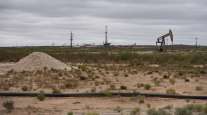Keystone Pipeline Would Benefit U.S., ATA Official, Others Tell D.C. Forum
This story appears in the Oct. 17 print edition of Transport Topics.
The proposed controversial Keystone XL pipeline from Canada to Oklahoma would supply a stable and secure source of energy for the United States and its trucking industry, and its construction should be approved, an American Trucking Associations official told the State Department this month.
“We import 51% of the crude oil in this country from foreign sources,” Richard Moskowitz, ATA’s regulatory affairs counsel, said at an Oct. 7 hearing about the project in Washington.
“If we turn our backs on Canadian oil, we’re still going to demand the same amount of fuel. The only difference is, we’re going to have to get it elsewhere, from less secure places of the globe, and that will impact our energy security,” he said.
TransCanada, based in Calgary, Alberta, has proposed to build the 1,700-mile Keystone XL pipeline to connect oil sands in Canada and adjacent areas to refineries on the Gulf Coast. The U.S. State Department must certify that the project is in the national interest of the United States, and it plans to make a determination by the end of the year, the Associated Press reported.
Environmentalists have blasted the plan, saying it would encourage dependence on fossil fuels, while supporters, such as ATA, argue that it would increase energy security.
“The ongoing crisis in the Middle East should serve as a wake-up call on the need to improve our domestic energy security,” Moskowitz testified. “And the Keystone XL pipeline is a critical component of that infrastructure to improve our energy security.”
The hearing allowed anyone who attended to speak. Many of the speakers were environmentalists or representatives from labor unions whose members would work on the pipeline’s construction.
“Those were the two most vocal groups that were there,” Moskowitz told Transport Topics later.
Moskowitz also is chairman of the Consumer Energy Alliance, an organization that represents the views of energy consumers. He testified on behalf of ATA.
In addition to the energy security benefits, trucking would see freight demand rise with the construction of the pipeline, Moskowitz said.
“The construction project itself is probably the largest privately funded construction project that will be undertaken in 2012, hopefully. And that’s likely to create 20,000 new construction jobs,” he said.
But Moskowitz also responded to environmental concerns, arguing that using the pipeline would create lower carbon emissions than other ways that Canadian companies could sell the oil.
“If we don’t build it, it goes to Vancouver by train or by truck,” he testified. “And as much as I’d like to see it go by truck, the fact of the matter is that there are more carbon emissions associated with those other modes of transportation than there are with pipelines.”
As to whether or not the pipeline would be in the national interest of the United States, Moskowitz said that it most definitely would be positive.
“Being that we import roughly 51% of our oil, replacing roughly half of the oil that we import from the Middle East with fuel that comes from Canada, Montana and the Dakotas, is in our national interest,” he said.




